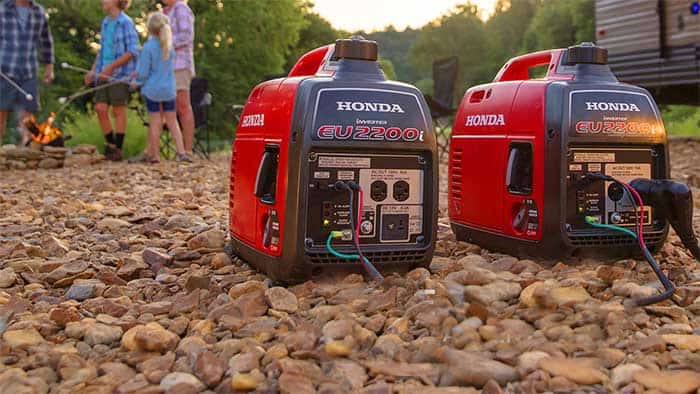Last Updated on April 25, 2023 by Rod Olivares

When it comes to getting back up power for your home during a blackout or to charge your phones on a camping trip, a generator is going to come in handy.
You can choose from a gasoline generator or a solar generator and depending on what you plan on powering, the choice can be quite simple.
Today, we are going to look at the differences between a solar generator and a classic gasoline generator to give you a better understanding of which you may need for your application.
I will leave out dual fuel generators for the purpose of this post, but you can find my dual fuel buying guide here.
Benefits Of Solar Generators
Solar generators are loaded with great benefits when compared to gasoline generators.
They are a great tool to have for just about any occasion whether it’s to power small appliances during a blackout or to charge electronics when camping or hiking.
Let’s take a look at some of the most popular benefits you can expect from a solar generator.

No Harmful Emissions
Gasoline engines produce exhaust gases and will have to be used outdoors in a well vented area. Solar generators create no emissions and can be used indoors, in tents, or even in your vehicle with no worries.
Usually Smaller
Solar generators do not contain motors, so their overall size is much smaller than gasoline generators. This makes them lightweight and easy to carry by just about anyone.
Various Ways To Charge
By allowing three different ways to charge your solar generator, you can easily keep it charged at all times without having to worry about filling up a gas tank or running out of fuel.
Cons Of Solar Generators
While solar generators have many benefits, there are going to be some drawbacks when comparing them to gasoline generators.
Let’s take a look at the cons of solar generators.
Less Power
Due to the fact that solar generators do not have gasoline engines, their power output is not as large as gas generators. While this may not be a bad thing if you are just needing to charge up small electronics, but if you are needing larger power, you may stick with a gas generator.
Shorter Lifespans
The lifespan of a solar generator is often shorter than a gasoline generator as you are using batteries that have specific cycle life spans. Gasoline engines can be maintained and last much longer than solar generators.
Not Ideal For Home Backup Power
If you are wanting a generator that is going to get you through a power outage in your apartment, townhome, or single family house, you may think twice about a solar generator.
While many of the larger solar generators can power appliances such as a refrigerator, a gasoline generator will do this plus much more with ease. However, I recommend a battery-powered generator for apartments, townhouses, condos, or even a tiny house. Basically, any place or space where having a gas-powered generator inside is not feasible or permitted. If you have neighbors around, those can also get pretty loud (especially if the power goes out during late night or evening hours).
How Do Solar Generators Work?
 A solar generator works by utilizing batteries, solar panels, and an inverter to transfer solar rays into electricity.
A solar generator works by utilizing batteries, solar panels, and an inverter to transfer solar rays into electricity.
To use a solar generator, all you have to do it plug in the solar panels into the generator itself and set the panels in direct sunlight to absorb sunlight.
It is regarded as one of the most cost-efficient ways to power electronics as all you have to pay for is the generator and solar panels. Unlike gasoline or propane generators, there is no recurring fuel cost to power your generator.
Another great thing about a solar generator is that most have alternative charging methods.
You can charge solar generators with a standard home plug or a car cigarette lighter on your next road trip to have on the go electricity that can be used at any time.
This makes the solar generator very versatile and is just one of the many benefits you can expect from choosing a solar generator.
Benefits Of Gas Generators
Gas generators are great for many different applications as they come in various sizes to power the smallest up to the largest of appliances. Some are even powerful enough to power a full RV.
Let’s take a look at some of the most popular benefits you can expect from gas generators.

Usually More Powerful
Gas powered generators are best known for their power capabilities.
Gasoline engines produce far more power than solar panels are able to produce. You can get anything from a couple of hundred-watt capacity up to 10,000+ watts.
Rugged
Gas generators are very rugged in design and make a great addition to any worksite. Many are available with frames and covered sockets to allow for use in the most rugged conditions.
Quick Start Up Time
Due to gas generator never needing to charge up like solar generators, you have on-demand power at all times.
As long as you have fuel, you can start your generator and get power as quickly as you can pull the pull start.
Cons Of Gas Generators
While gas generators can be great for construction and home back up, they are not ideal for close residential quarters or camping next to others.
Here are a few drawbacks you can expect from using a gas generator.
Loud
Due to the gasoline engine used to power these types of generators, you can expect these generators to produce quite a bit of noise.
While this will not be an issue on a job site, you may get a few complaints if you are using this in a neighborhood or campsite.
Heavy
With the added weight of an engine and framing, gas generators can exceed over 100lbs in many cases with some not being equipped with wheels.
This will require some help when moving them from one location to the next.
Requires Ventilation
Gasoline engines produce exhaust gases than can be harmful if not properly ventilated. This restricts the use of gasoline generators to the outdoor or in a well ventilated, open space.
Large
Gas generators are very large when compare to solar generators. The added engine and framing make these generators much larger, therefore taking up much more space in your truck or garage.
Which Type Is Best For Me?
Determining which generator is going to be best for you will subjective to what you will be using the generator for.
Each type of generator will be available in many different sizes to fit different needs, but there may be something that restricts you from using it in a certain situation.
For those who are needing to power smaller appliances on a camping trip or during a hike, a solar generator is going to be the best bet. This type of generator will be very quiet, easy to carry, and can be used in a car or tent with no harmful emissions.
For larger home appliances or multiple power tool uses, a gas generator may be the better solution.
Gasoline generators have very long run times when under heavy loads and are a great way to keep appliances running until your power is restored.
An easy way to determine if the generator you are looking at is going to be good for you is to check the wattage capabilities of the generator and compare them to the wattage demands of the appliances you will be using. (You can use my online calculator for this)
For Camping

When camping, you are out getting disconnected from the world and really enjoying the peace and quiet of nature.
However, you will always want to keep your phone charged in the event of an emergency or just to simply check the weather.
A solar generator is going to be the best generator for most camping situations. Solar generators are quiet, can be charged anywhere there is sunshine, and create no harmful emissions allowing them to be used in tents or campers.
Most solar generators are capable of powering small cell phone chargers, but if you start adding in laptops, Langley’s, or other electronics, you are going to want to find a solar generator capable of supplying the wattage demand of all of your electronics.
There are many different size solar generators to choose from, but you will need to keep in mind the size of the generator and if you are going to be able to easily carry it with you when you go camping.
Whole House Backup Power Supply

Experiencing a black out during a storm is not something anyone looks forward to.
Having to deal with air conditioning, heating, hot water, and food going bad are just some of the fears most people have with extended power outages.
With an adequate size gas generator, you can avoid most of these problems and make sure you and your family stay as comfortable as can be during your next power outage.
Gasoline generators are the most popular generator for home back up power and can be hardwired or hooked up as needed.
Their high power and long run times make them ideal for running larger appliances such as refrigerators and ac units.
Finding one with multiple outlets allows you to keep these appliances running while still being able to charge your cell phone or tablet to keep up with any news or changing weather conditions.
Thing To Remember When Operating Generators

When operating generators, whether they are solar or gas, there are going to be a few things that you will need to remember to ensure you are staying safe and getting the most life out of your generator.
Safety
The most important thing to take into consideration when operating generators is safety. Gasoline generators can pose a very dangerous threat if used or ventilated improperly.
Some solar generators are not suitable for use in extreme conditions.
Be sure to make yourself very familiar with your user manual to make sure you are operating your generator correctly.
Maintenance
To ensure that you are getting the most from your generator and extending the life as long as you can, become familiar with the maintenance schedule provided in your user manual.
While solar generators require little maintenance, gas generators will need to be taken care of according to the guidelines to ensure a long-lasting generator.
Wattage Limits
Last but not least, you will need to know the wattage limits of your generator. Overpowering your generator or running it at full capacity at all times can seriously decrease the life of your generator.
The last thing you want to do in a power outage is overload your generator and render it useless.
Conclusion
Now that I have discussed the various differences between a gas generator and a solar generator, you should be able to pick out the right type of generator for your application.
If you have used either of these generators, I would love to hear your experiences. What were some pros and cons of using your generator? Do you wish you had gone a different route? What specific generator do you recommend?

Scott Krager purchased generatorgrid.com in the summer of 2020 and quickly began to buy every generator under the sun! He currently has over a dozen generators and the number is growing quickly. He lives in Portland, OR near his family and friends.
GeneratorGrid.com is an independent review business. I am not affiliated with any manufacturers and do not accept paid reviews. When you buy through my links, I may earn a commission which helps me purchase more generators for testing. - Scott Krager

